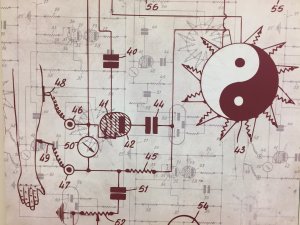Presented By: Lieberthal-Rogel Center for Chinese Studies
LRCCS Noon Lecture Series | Ryodoraku (良導絡) in New China: Sino-Japanese Medical Exchange and the Role of Machines in East Asian Medical Modernity
Ruth Rogaski, Associate Professor of History, Vanderbilt University

In 1958, members of the PRC Ministry of Health witnessed a demonstration of a "Ryodoraku electrodermometer," an apparatus invented by Nakatani Yoshio中谷義雄 (1923-1978) that purported to prove the existence of acupuncture meridians on the surface of the body. The machine had been brought to China from Japan in the winter of 1957 by members of a Chinese medical delegation, part of a series of semi-official cultural exchanges between the two countries during a brief moment of political rapprochement. This talk details how the machine managed to travel from Osaka to Beijing in the middle of the Cold War, and probes the electrical genealogy of the Nakatani machine in the context of medical modernization in China and Japan. The larger goal of this paper is to illuminate the ways that practitioners envisioned the relationship between science and traditional medicines in the twentieth century, highlighting the role of machines in negotiating this relationship.
Ruth Rogaski is a historian of Qing and modern China, with allied interests in the history of medicine, urban history, women’s and gender history, and social and cultural history in early modern and modern East Asia. She is the author of Hygienic Modernity: Meanings of Health and Disease in Treaty-Port China (University of California Press, 2004), which traces how hygiene became a crucial element in the formulation of Chinese modernity in the nineteenth and twentieth centuries. Hygienic Modernity was awarded the Fairbank Prize in East Asian history, the Levenson Prize in Chinese studies, the Welch Medal in the history of medicine, and was co-recipient of the Berkshire Prize. She has written widely on topics such as germ warfare, Chinese orphanages, and martial arts history. At present she is completing "The Nature of Manchuria," which examines the intersection between natural history and projects of empire in northeast Asia from the seventeenth century to the present. Grants and fellowships from the John Simon Guggenheim Memorial Foundation, the National Science Foundation, and the American Philosophical Society have funded her research and writing.
Ruth Rogaski is a historian of Qing and modern China, with allied interests in the history of medicine, urban history, women’s and gender history, and social and cultural history in early modern and modern East Asia. She is the author of Hygienic Modernity: Meanings of Health and Disease in Treaty-Port China (University of California Press, 2004), which traces how hygiene became a crucial element in the formulation of Chinese modernity in the nineteenth and twentieth centuries. Hygienic Modernity was awarded the Fairbank Prize in East Asian history, the Levenson Prize in Chinese studies, the Welch Medal in the history of medicine, and was co-recipient of the Berkshire Prize. She has written widely on topics such as germ warfare, Chinese orphanages, and martial arts history. At present she is completing "The Nature of Manchuria," which examines the intersection between natural history and projects of empire in northeast Asia from the seventeenth century to the present. Grants and fellowships from the John Simon Guggenheim Memorial Foundation, the National Science Foundation, and the American Philosophical Society have funded her research and writing.